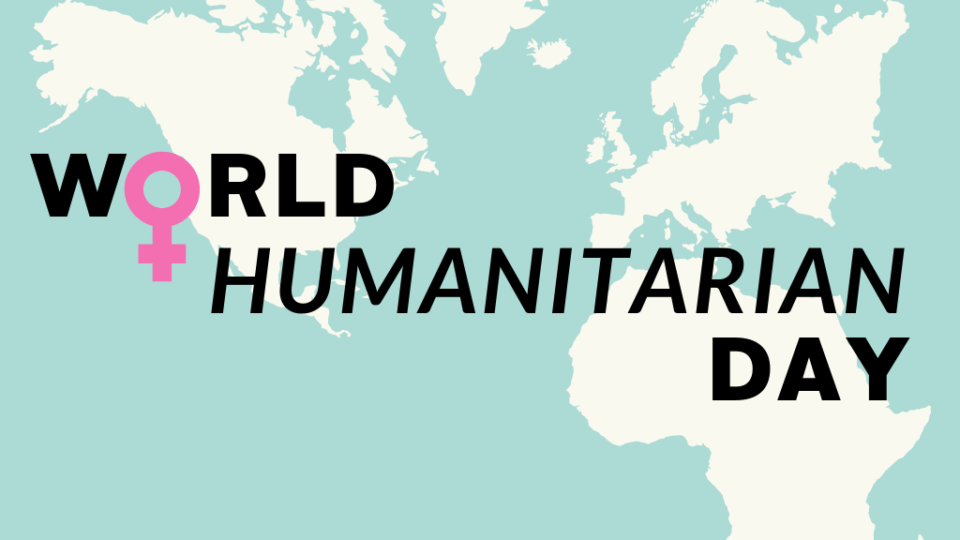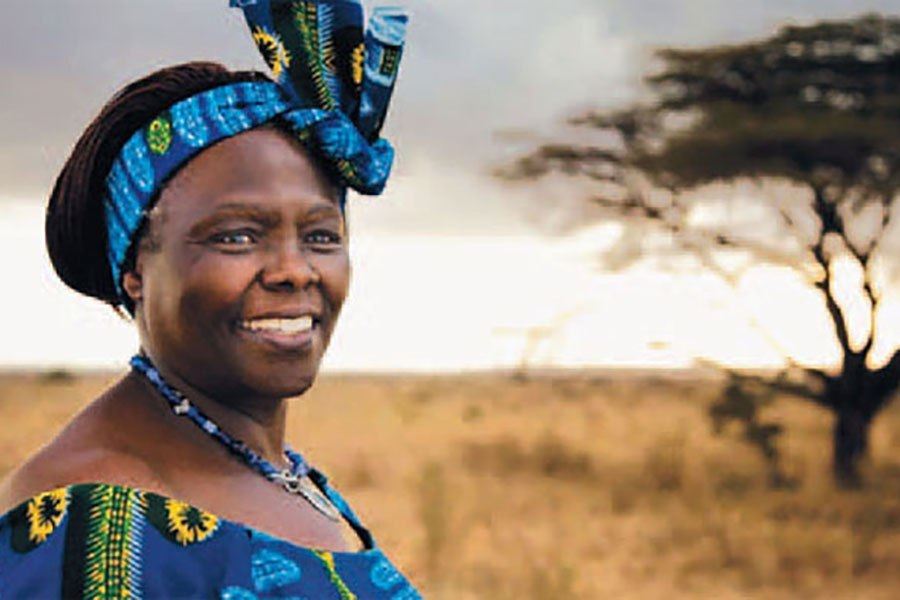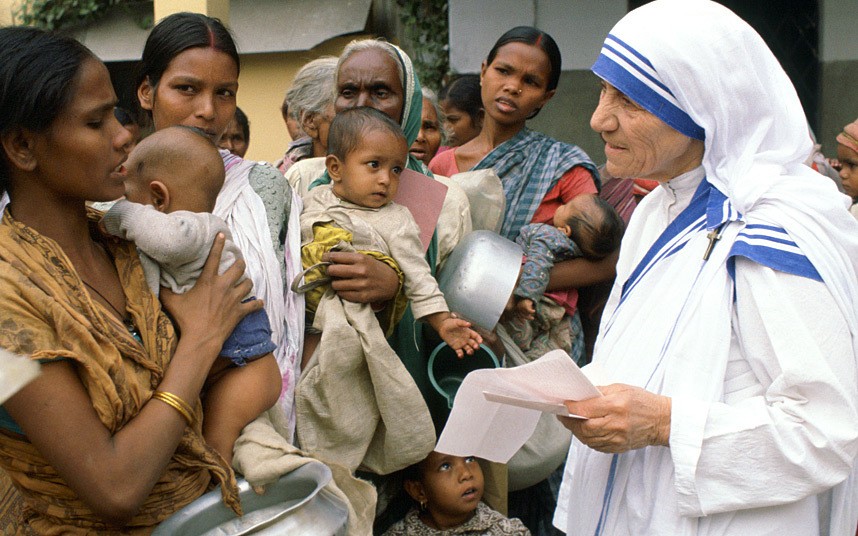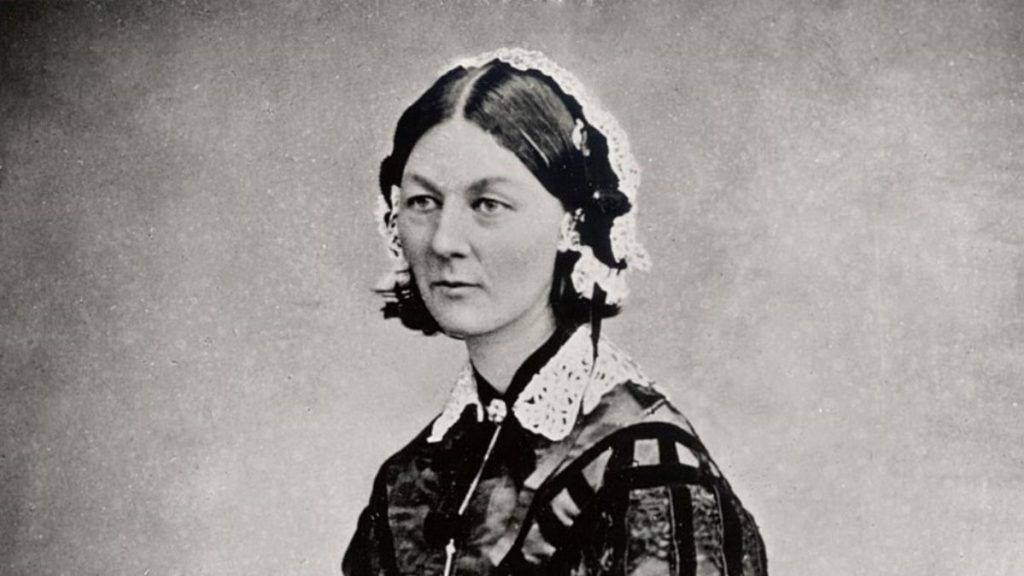World Humanitarian Day 2019: #Women Humanitarians

August 19th is World Humanitarian Day, a day to pay tribute to aid workers around the world who risk their lives in service to others, and to build support for people affected by crises around the world. This year, we celebrate the work of women in humanitarian crises and their dedication to the people they serve. Join us in celebrating five #Women Humanitarians whose strength, actions, and legacies inspire us to make the world a better place.
1) Wangari Maathai

PC: Real Leaders
About the Humanitarian:
The late Wangari Maathai founded the Green Belt Movement (GBM) – an environmental organization that empowers communities, particularly women, to conserve the environment and improve livelihoods. In 2004, Wangari received the Nobel Peace Prize, the first African woman to ever receive this honor. She was also the first woman in East and Central Africa to earn a doctorate degree and to become a professor at the University of Nairobi.
Maathai dedicated her life to responding to and improving the lives of rural Kenyan women, who like so many women living in the developing world, are disproportionately impacted by the world’s ongoing environmental crises.
“The generation that destroys the environment is not the generation that pays the price. That is the problem.” – Wangari
Maathai founded GBM in 1977, in response to reports by Kenyan women that their streams were drying up, food supply was dwindling, and forest wood was disappearing. Maathai’s organization worked with women in communities to collectively plant tree seedlings and store rainwater, minimizing the devastating results of environmental destruction on their small communities.
Since she started the movement in 1977, the GBM is responsible for planting over 51 million trees, and training over 30,000 women in forestry, food processing, bee-keeping, and other trades that help them earn income while preserving their lands and resources.
Why Does it Matter?
Our global environmental crisis is among the most pressing of our time. Between 1970 and 2014, 60 percent of the world’s mammals, birds, fish, reptiles, and amphibians disappeared. 60 percent! This is in addition to losing nearly half of shallow water corals in the past 30 years, and 20 percent of the Amazon Rainforest in just 50 years. Each of these losses have devastating, long-term effects on all of us, though the immediate impact effects some communities around the world more than others.
Today, while the global environmental crisis continues to grow, let us all be inspired (and moved to act) by Wangari Maathai’s dream of a “values-driven society of people who consciously work for continued improvement of their livelihoods and a greener, cleaner world.”
2) Malala Yousafzai

PC: Financial Times
About the Humanitarian:
Born in Mingora, Pakistan in 1977, Malala spoke out against the Taliban’s ban on education for females. As a result of her bravery and stance, Malala became a target and was attacked in October of 2012.
Since then, Malala has dedicated her life to standing up for every girl’s right to go to school. With the support of her father, she established the Malala Fund with the mission to support girls around the world with the opportunity to achieve a future they choose. In recognition of her fight for equality and female empowerment, Malala became the youngest Nobel Laureate in history.
“I tell my story not because it is unique, but because it is the story of many girls.”
Why Does it Matter?
Education is a human right and the only way towards a brighter future. Tragically, 130 million girls around the world still go without an education. From cultural barriers or insufficient funds, to a fear of violence at school or on the way to school, girls around the world continue to face insurmountable barriers to accessing education.
When girls are barred from the education they deserve, they are barred from the future they deserve. The Malala fund continues to work towards a future where, “… every girl can learn and lead.”
3) Mother Teresa
About the Humanitarian:
When you think of charity what do you think of? Donating money or dedicating time? What about dedicating your entire life to not only serving the poorest of the poor, but living alongside them? Mother Teresa is remembered for doing just this, and she left behind a legacy that has gone on to inspire generations.
Born in Albania in 1910, Mother Teresa new her calling by the age of 12. It was then that she devoted her life to the Catholic Church. By 1946, she is said to have experienced “the call within the call,” leaving the comforts of the convent for the hardships of India’s streets.
It was here that her service to the poor led to the development the Congregation Missionaries of Charity – now known in the Catholic Church as Saint Teresa of Calcutta – an organization that, throughout her life and after her death, continues to support individuals affected by poverty around the world. One of the key vows for all members of the congregation is the “wholehearted free service to the poorest of the poor.”
“It’s not how much we give but how much love we put into giving.”
This includes providing care to refugees, the mentally ill, sick and abandoned children, lepers, people with AIDS, and the elderly. Mother Teresa and the congregation helped set up schools run by volunteers to educate street children, they run soup kitchens for the hungry, and various services according to the needs of the communities they serve. All of this is done free of charge to all those who need it.
Why Does it Matter?
Despite overall advances in the fight against poverty, in some of the most fragile corners of the world, poverty continues to rise. Sub- Saharan Africa accounts for the majority of the world’s poor, with the number of people living in poverty increasing from 278 million in 1990 to 413 million in 2015. In the poorest regions in the world, nearly 40 percent of the population is impacted by hunger, lack of healthcare, and severely limited economic opportunity.
Mother Teresa’s spirit, strength, and unwillingness to give up in times of incredible hardship inspires organizations around the world, including us here at CMMB, to dedicate our resources, skills, and careers to continuing her mission to serve the poor.
4) Dorothy Day

PC: In These Times
About the Humanitarian:
Born in 1897, Dorothy Day is remembered for her unapologetic journalism, social activism, and dedication to the suffragist movement. She is credited with helping establish the Catholic Worker Movement, providing direct aid for those living in extreme poverty and advocating on their behalf. She was a champion for the poor, a political radicalist, and fought for the rights of so many — including her own.
Through her lifelong work for the needy and her unique journey towards faith, Pope Francis recognized her as an exemplary American in history: “In these times when social concerns are so important, I cannot fail to mention the Servant of God Dorothy Day, who founded the Catholic Worker Movement. Her social activism, her passion for justice and for the cause of the oppressed, were inspired by the Gospel, her faith, and the example of the saints.”
“People say, ‘What is the sense of our small effort?’ They cannot see that we must lay one brick at a time, take one step at a time.” – Dorothy Day
Why Does it Matter?
Thanks to the collective effort of women like Dorothy Day, women have practiced their right to vote in the United States since 192o. Unfortunately, this achievement is not universal. Around the world, cultural norms and the threat of violence continue to stand as barriers to women’s right to vote, access to education, and opportunities for empowerment.
And while strides have been made for women in some parts of the world, there is still much to be done. Here are some facts and figures to give you a perspective.
- In the least developed countries around the world, less than 60 percent of women complete primary school and only 30 percent go on to secondary school.
- Women hold 4.8% of CEO positions at S&P 500 companies (S&P 500 companies are the top 500 companies measured on the stock market index).
- Of the world’s researchers, only 30% are women.
- Around the world, 2.7 billion women are legally restricted from having the same job opportunities as men.
These are only a few examples of the inequalities affecting the livelihood of women around the world. We look to the example of Dorothy Day, and others like her, to continue fighting for equality around the world.
5) Florence Nightingale
About the Humanitarian:
Born in May of 1812, Florence Nightingale is revered as the pioneer of modern day nursing. She found her passion for nursing at an early age, and is said to have believed her vocation a divine calling.
Nightingale is most remembered for her work during the Crimean War where more soldiers were dying from ailments such as cholera and typhoid than battle injuries. Her work to improve the sanitary conditions in the hospital and make proper use of limited resources decreased the hospital’s death rate by two thirds.
After returning home, she continued developing the nursing profession, dedicating money and time to founding the St. Thomas’ Hospital and the Nightingale Training School for Nurses.
“It may seem a strange principle to enunciate as the very first requirement in a hospital that it should do the sick no harm.” – F. Nightingale
Why Does it Matter?
Today, hospitals and health facilities located in the most remote regions of the world, often lack access to a variety of critical resources — including running water. In fact, 896 million people around the world do not have access to water at their local health facilities, while 21 percent of health facilities lack adequate sanitation resources.
Without access to water and proper sanitation, the risk of infection is extremely high and can lead to death among already fragile patients. Around the world, over 200,000 babies die every year from sepsis — an infection associated with inadequate sanitation.
Florence Nightingale set a global standard for modern day nursing. Through her legacy, it is the responsibility of global health organizations around the world to see it through.
And these are just some of the most well known female humanitarians. There are so many more just like them, quietly but forcefully changing the world for the better. We know many here at CMMB, including our international volunteers, community health workers, and dedicated staff members. If you don’t know one, be one. Change starts with you.

